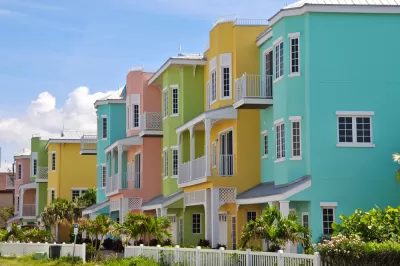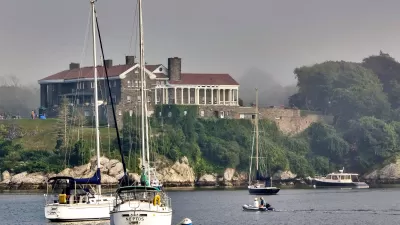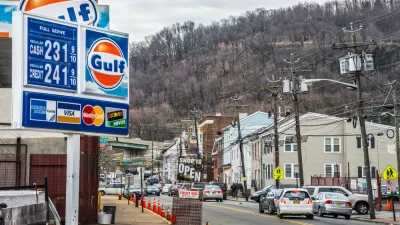Former Maryland Gov. Parris Glendening penned a local opinion for The Washington Post in support of the TCI to advance funding of alternatives to driving and ask readers to shape the controversial initiative by submitting comments by Feb. 28.

Parris N. Glendening, governor of Maryland from 1995 to 2003 and current president of Smart Growth America’s Leadership Institute, wants local readers of the Washington Post to address climate change by participating in one of the country's most important programs to target carbon emissions from driving, the Transportation and Climate Initiative (TCI), calling it "an opportunity to create more walkable and bike-friendly communities served by transit."
Regional leaders from 12 states and the District — from Virginia to Maine — are working collaboratively to develop a regional cap-and-invest system to reduce carbon emissions from the transportation sector and provide a new source of revenue for clean, climate-friendly transportation.
What we do in the Northeast and Mid-Atlantic region can be a model for success if we all work together. We undermine our economic, equity and climate goals by favoring new highways, roads and more lanes that induce more driving instead of transit, biking and walking.
According to the TCI fact sheet [pdf] explaining how the cap-and-invest program would work to reduce pollution, large gasoline and diesel fuel suppliers would have to purchase allowances based on the carbon intensity of the fuels they sell. In addition, a cap or upper limit would be set as to how much carbon pollution can be emitted from these fuels, which would be lowered in time, thus increasing the cost of the emissions, acting similarly to the CO2 allowance auctions operated by the Regional Greenhouse Gas Initiative for the power sector in the same Mid-Atlantic and New England regions.
Fuel suppliers, while not obligated, would likely pass on the allowance costs to consumers, which explains why TCI opponents call it a "gas tax." However, many if not most gas taxes, by law, must be spent on road improvement projects that designed to reduce traffic congestion, such as road widenings, thus increasing driving and emissions. TCI revenue would be used to do the opposite–reduce emissions.
Individual states would determine how to invest revenues, be it for electric vehicle charging infrastructure, public transit improvements, bike and pedestrian infrastructure, transit-oriented development, etc.
"Residents from across this area can offer their comments through Feb. 28 to shape the initiative," adds Glendening.
Related in Planetizen:
-
East Coast Considers Plan to Hike Gas Prices to Mitigate Climate Change, December 30, 2019
- Maryland's Smart Growth Law A Dud According To University Study (on Glendening's policies as governor), November 5, 2009
Hat tip to Kenyon Karl.
FULL STORY: We need better transportation options, not more roads and more lane

Alabama: Trump Terminates Settlements for Black Communities Harmed By Raw Sewage
Trump deemed the landmark civil rights agreement “illegal DEI and environmental justice policy.”

Planetizen Federal Action Tracker
A weekly monitor of how Trump’s orders and actions are impacting planners and planning in America.

The 120 Year Old Tiny Home Villages That Sheltered San Francisco’s Earthquake Refugees
More than a century ago, San Francisco mobilized to house thousands of residents displaced by the 1906 earthquake. Could their strategy offer a model for the present?

In Both Crashes and Crime, Public Transportation is Far Safer than Driving
Contrary to popular assumptions, public transportation has far lower crash and crime rates than automobile travel. For safer communities, improve and encourage transit travel.

Report: Zoning Reforms Should Complement Nashville’s Ambitious Transit Plan
Without reform, restrictive zoning codes will limit the impact of the city’s planned transit expansion and could exclude some of the residents who depend on transit the most.

Judge Orders Release of Frozen IRA, IIJA Funding
The decision is a victory for environmental groups who charged that freezing funds for critical infrastructure and disaster response programs caused “real and irreparable harm” to communities.
Urban Design for Planners 1: Software Tools
This six-course series explores essential urban design concepts using open source software and equips planners with the tools they need to participate fully in the urban design process.
Planning for Universal Design
Learn the tools for implementing Universal Design in planning regulations.
Clanton & Associates, Inc.
Jessamine County Fiscal Court
Institute for Housing and Urban Development Studies (IHS)
City of Grandview
Harvard GSD Executive Education
Toledo-Lucas County Plan Commissions
Salt Lake City
NYU Wagner Graduate School of Public Service





























